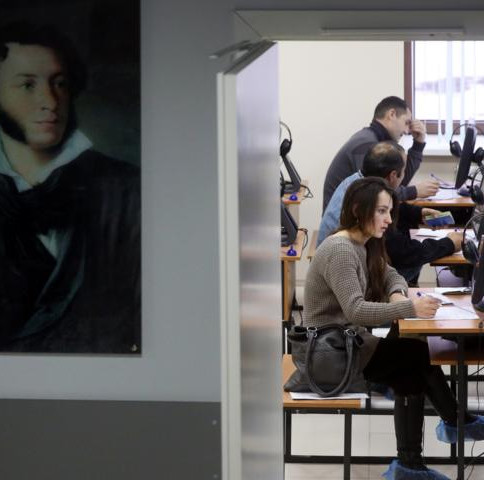The three-day summit of the Group of Seven (G7) ended in Biarritz on Monday producing no essential results. It would be enough to say that for the first time since the establishment of this format in 1976, the participants did not issue the joint communique. French President Emmanuel Macron tried to laugh it off saying: “No one reads the communiques, let’s be honest.” But the fact is that there are evident disagreements in the G7 camp, and the summit in Biarritz that took place amid mass protests of anti-globalization activists has again confirmed it.
On the eve of the summit it turned out that European Commission President Jean-Claude Juncker would miss the event because of he had underwent surgery and had to remain in hospital. In Biarritz the European Commission was represented by the European Council President Donald Tusk. Soon bad news came from the US: President Donald Trump suddenly said that he would not attend the summit either. According to CNN, the American leader “didn't view the gathering as a particularly productive use of his time.” To encourage Trump to go to France his aides managed to add global economy issues to the agenda of the summit’s Sunday session so he could boast the state of the US economy in front of the leaders of G7 countries where the economic growth has recently slowed down. Trump actually did it.
Actually, the US leader’s first intention not to go to the summit in France was right – with each passing year, the G7 format becomes less attractive and less promising. Even though the world leaders had a quite wide agenda in Biarritz: from fighting inequality to dangerous climate changes, from trade and economic disagreements to the situation in Syria, Libya, Iran and Ukraine.
But the problem is not with the agenda. It seems like the G7 format is finished. Initially, the summit was established to resolve global problems, but gradually, especially after Russia left the G8 in 2014, these meetings became nothing but gatherings of the high and mighty where no essential decision are taken. Last year, Donald Trump lost interest in the agenda of the G7 summit in Canada and left it before it was over.
It is not a coincidence that, on the eve of the summit in Biarritz, they intensively discussed the possibility of returning to the G8 format with Russia becoming the group’s member again. This discussion continued during the summit as well. Allegedly, French President Emmanuel Macron came up with the idea of returning to the G8 format shortly before the meeting in Biarritz. More precisely, according to CNN, he suggested that they should invite the Russian leadership to the 2020 summit in the United States. Macron soon denied the report by the US television channel and said that it would be wrong to take Russia back to the G7 because first it is necessary to resolve the situation in Ukraine. However, Donald Trump supported the idea of returning to the G8 format that was initially attributed to Macron. According to the Guardian, he even argued with other G7 leaders in Biarritz on this matter.
However, opponents of Russia's readmission to the G7 today have an advantage in numbers: the UK, Germany, Canada and even France, although with some reservations. Only Italian Prime Minister Giuseppe Conte supported Trump on this issue in Biarritz, while Japanese leader Shinzo Abe abstained.
Kremlin has already commented on the possibility of Russia’s readmission to the club of the world most industrialized nations. Moscow is not particularly enthusiastic about this. In particular, Vladimir Putin’s spokesman Dmitry Peskov noted that, although Russia has never rejected any cooperation formats, the return to G8 is “not a goal in itself” for Moscow. Today, participation in the work of the G20, SCO and BRICS is the priority for Russia.
Moreover, the members of G7 must first agree among themselves. The summit in Biarritz proved once again that there are serious disagreements within the G7. For example, President Trump and other G7 leaders failed to agree not only regarding Russia, but also on other issues of international politics, including those related to China, Iran and North Korea, according to an article published in the Wall Street Journal on Sunday. In general, the recent Biarritz summit was more like a meeting of people who had nothing to talk about with each other, since everyone was trying to discuss the issues that worried only him.
It is not quite clear who will overcome the differences within the G7 since some of the seven leaders who gathered in Biarritz can be regarded as "lame ducks." It looks like now 73-year-old Donald Trump is the one who has best chances of political longevity and may be re-elected as the US President in 2020. Meanwhile Canadian Prime Minister Justin Trudeau may lose the upcoming parliamentary elections in October. German Chancellor Angela Merkel has already announced that she will soon leave big politics.
One cannot be quite sure that French President Emmanuel Macron will retain his post after the 2022 election. UK Prime Minister Boris Johnson is more concerned about Britain’s exit from the EU, and his political future is therefore very vague. Japanese Prime Minister Shinzo Abe is more and more focusing on the problems of his region. As for the future political leader of Italy, there is nothing to talk about now, when the country is going through another government crisis.
It turns out that there is no one within G7 who could focus on resolving the global issues of stability and security. The Biarritz Summit proved once again that tackling the issues the global community is facing is currently not in the power of the G7 members, especially without Russia’s participation.









